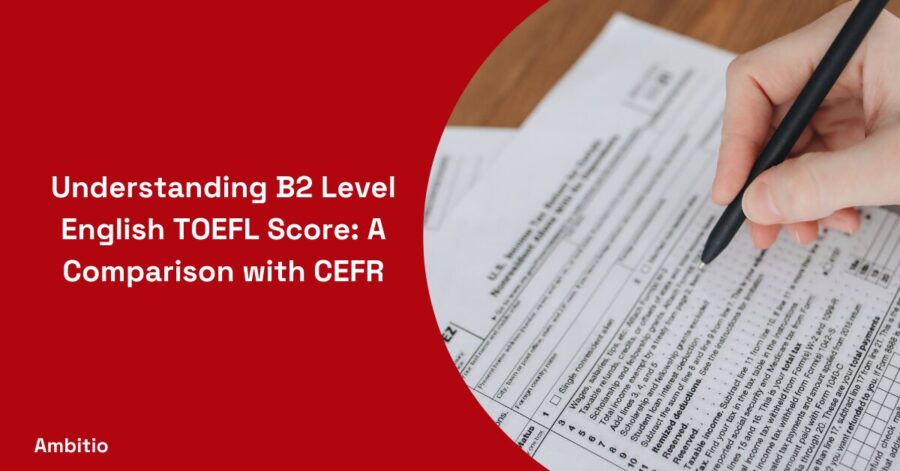14 December 2024
6 minutes read
Understanding B2 Level English TOEFL Score: A Comparison with CEFR

Introduction
Achieving a B2 level of English proficiency is a significant milestone for language learners. It signifies the ability to navigate through a wide range of everyday situations and even handle more complex tasks with confidence.
In this comprehensive guide, we will explore B2 level English proficiency, with a focus on TOEFL scores and their comparison to the Common European Framework of Reference for Languages (CEFR).
We’ll delve into essential TOEFL information, map TOEFL scores to CEFR levels, and discuss the advantages and disadvantages of using TOEFL as a measure of B2 proficiency.
Compare TOEFL and CEFR Proficiency Levels
What is a B2 Level English Proficiency?
The B2 level in English proficiency, as defined by the CEFR, represents an “Independent User.” At this level, individuals can:
- Understand the main ideas of complex text on both concrete and abstract topics.
- Interact with native speakers with a degree of fluency and spontaneity.
- Produce clear, detailed text on various subjects.
Understanding the CEFR Scale
Before we dive into TOEFL scores, let’s take a closer look at the CEFR scale, which ranges from A1 (Beginner) to C2 (Proficient). B2 sits comfortably in the middle, representing a strong intermediate level.
TOEFL iBT and B2 Level
The TOEFL iBT (Internet-Based Test) is a widely recognized exam for assessing English proficiency. How do TOEFL scores align with a B2 level? To answer this question, let’s explore TOEFL score requirements for a B2 equivalent.
TOEFL Essentials for B2 Level
What is TOEFL?
TOEFL, short for Test of English as a Foreign Language, is designed to evaluate the English language proficiency of non-native English speakers. It measures your ability to understand and use English at a university level.
TOEFL Score Range
TOEFL scores range from 0 to 120, with each of the four sections (Reading, Listening, Speaking, and Writing) scored out of 30. Achieving a B2 level requires a specific range of scores.
Minimum Scores for B2
To be considered at a B2 level, you would typically aim for a total TOEFL score of 87 to 109. Here’s a breakdown:
- Reading: 22 to 24
- Listening: 18 to 23
- Speaking: 18 to 25
- Writing: 24 to 26
These scores demonstrate your ability to comprehend complex texts, engage in discussions, and express yourself effectively in writing.
Mapping TOEFL Scores to CEFR Levels
The CEFR and TOEFL Mapping
Understanding how TOEFL scores align with CEFR levels is crucial for anyone aiming for a specific language proficiency. Let’s map TOEFL scores to their CEFR counterparts.
CEFR B2 Level and TOEFL
When you achieve a TOEFL score within the range mentioned earlier (87 to 109), you can confidently say that you’ve reached a CEFR B2 level in English proficiency. This means you are an independent user of the language, capable of interacting effectively in various contexts.
Total Score vs. Section Scores
It’s important to note that the TOEFL exam provides not only a total score but also individual section scores. Universities and employers may have specific requirements for each section, so make sure to check those too.
| Aspect | Total Scores | Section Scores |
|---|---|---|
| Definition | Cumulative score from all four sections (Reading, Listening, Speaking, Writing). | Scores for each section (Reading, Listening, Speaking, Writing). |
| Purpose | Overall language proficiency measure. | Detailed skill assessment. |
| Interpretation | Single score (0-120) vs. Four separate scores (0-30). | |
| University Admission | Often used; may specify section requirements. | May focus on specific sections. |
| Employment Opportunities | Verified proficiency; focus varies by job. | |
| Strengths | Quick overall assessment. | Identifies specific strengths/weaknesses. |
| Weaknesses | May not pinpoint skill gaps. | Risk of overemphasizing certain skills. |
| Test Preparation Strategy | Balanced approach. | Targeted skill enhancement. |
| Targeted Improvement | Limited precision. | Guided skill improvement. |
| Customization | Simplified comparisons. | Tailored to goals/requirements. |
Advantages and Disadvantages of TOEFL for B2 Level
Advantages of Using TOEFL for B2 Level Assessment
1. Global Recognition:
One of the significant advantages of using TOEFL for B2 level assessment is its global recognition. TOEFL scores are widely accepted by universities, colleges, and employers worldwide. This recognition makes TOEFL a valuable asset for individuals aspiring to study, work, or immigrate to English-speaking countries.
Whether you plan to enroll in an academic program or seek employment opportunities abroad, having a TOEFL score that demonstrates your English proficiency at the B2 level can open doors and enhance your prospects.
2. Objective Evaluation:
TOEFL offers an objective and standardized way to evaluate English language proficiency. All test-takers face the same set of tasks and are assessed based on consistent criteria.
This objectivity ensures fairness in evaluation, as each individual is judged using the same standards, regardless of their background or location.
The standardized nature of TOEFL means that your B2 level proficiency is measured against the same benchmarks applied to test-takers worldwide. This reliability is particularly valuable for institutions and employers seeking a consistent measure of English proficiency.
3. Four Skills Assessment:
TOEFL assesses all four essential language skills: reading, listening, speaking, and writing. This comprehensive evaluation provides a holistic view of your English language abilities. It goes beyond simple vocabulary and grammar knowledge to assess your practical communication skills.
For individuals aiming for a B2 level, demonstrating proficiency in each of these skills is vital. TOEFL allows you to showcase your capabilities in understanding written and spoken English, as well as your ability to express yourself fluently in both written and spoken forms.
4. Widely Accepted by Institutions:
Many universities and colleges in English-speaking countries require proof of English proficiency for admission. TOEFL scores are commonly accepted as evidence of language proficiency for these institutions.
Achieving a B2 level score on TOEFL can fulfill the language requirement for academic programs, ensuring you meet the necessary standards for enrollment.
Moreover, TOEFL scores are often used as a basis for awarding scholarships or determining eligibility for English language support programs.
A strong TOEFL score at the B2 level can enhance your scholarship prospects and help you access additional resources to improve your English skills.
5. Preparation Resources:
TOEFL offers a wealth of preparation resources, including official practice tests, study guides, and online courses. These materials are designed to help test-takers familiarize themselves with the test format, understand the types of questions asked, and practice their skills.
Having access to these resources makes it easier to prepare for TOEFL and increase your chances of achieving a B2 level score. Whether you choose to study independently or seek guidance from TOEFL preparation courses, these resources can significantly aid your journey to English proficiency.
Disadvantages of Using TOEFL for B2 Level Assessment
1. Academic Focus:
One significant disadvantage of using TOEFL for B2 level assessment is its strong academic orientation. The TOEFL iBT test primarily evaluates your English language skills in an academic context.
While this may be appropriate for individuals pursuing higher education in English-speaking countries, it can be less relevant for those seeking to use English in everyday, non-academic settings.
The TOEFL exam includes tasks like reading and summarizing complex academic texts, listening to lectures and taking notes, and writing essays on academic topics.
These tasks may not accurately reflect the language skills needed for day-to-day communication, such as casual conversations, social interactions, or workplace communication.
2. Test Anxiety:
TOEFL is a high-stakes standardized test, and the pressure to perform well can lead to test anxiety for some individuals. Test anxiety can negatively impact a test-taker’s performance, even if they possess the necessary English language skills. The timed nature of the test and the need to complete tasks within specific time limits can add to the stress.
Test anxiety can result in lower scores, which may not truly represent a test-taker’s actual English proficiency level. This is especially problematic for individuals who may be well-versed in English but experience anxiety during tests.
3. Cost:
Preparing for and taking the TOEFL exam can be expensive. Test registration fees, study materials, tutoring, and practice tests all contribute to the overall cost.
For individuals from economically disadvantaged backgrounds, these expenses can be prohibitive and may limit their access to a recognized English proficiency assessment.
The financial burden associated with TOEFL can be a significant drawback, as it can deter motivated individuals from pursuing educational or career opportunities that require proof of English proficiency.
4. Limited Emphasis on Speaking Skills:
While TOEFL does assess speaking skills, it may not fully capture a test-taker’s ability to communicate effectively in spoken English, especially in informal or real-world settings. The speaking section of the TOEFL exam involves responding to prompts and recording spoken responses in a controlled environment.
This format may not adequately evaluate a person’s ability to engage in spontaneous, real-time conversations, which are essential for everyday communication. As a result, individuals who perform well on the speaking section of TOEFL may still struggle with natural, unscripted spoken interactions.
Conclusion
Reaching a B2 level of English proficiency is a significant achievement, and the TOEFL exam is a valuable tool to measure it. By understanding the TOEFL score requirements for B2 and how they align with CEFR standards, you can better plan your language learning journey and confidently pursue academic or professional opportunities in English-speaking environments.
Remember that while TOEFL is a recognized standard, it’s just one of several options available for evaluating your English proficiency, so choose the one that suits your goals and needs best.
FAQs: Your Questions Answered
What is a B2 level English proficiency?
A B2 level signifies an independent user of English, capable of handling most situations, including complex ones, with relative ease.
How do TOEFL scores relate to B2 level proficiency?
TOEFL scores are mapped to CEFR levels, with a B2 level generally corresponding to a TOEFL score in the range of 87 to 109 out of 120.
What are the advantages of using TOEFL to assess B2 level proficiency?
TOEFL offers standardized testing, widely recognized by academic institutions and employers, making it a valuable tool for gauging English proficiency.
Are there any disadvantages to using TOEFL for B2 level assessment?
Some may find TOEFL challenging due to its format, which includes academic tasks. It may not fully capture everyday communication skills.
How can I prepare for TOEFL to achieve a B2 level score?
TOEFL preparation typically involves familiarizing yourself with the test format, practicing all sections, and improving your overall English language skills.
Can I use my B2 TOEFL score for admission to universities or job applications?
Yes, many universities and employers accept B2 TOEFL scores as proof of English proficiency. However, always check specific requirements.
Is TOEFL the only way to assess B2 level proficiency in English?
No, other tests like IELTS and Cambridge exams can also assess B2 level proficiency. It’s essential to choose the test that suits your needs best.

You can study at top universities worldwide!
Get expert tips and tricks to get into top universities with a free expert session.
Book Your Free 30-Minute Session Now! Book a call now




























